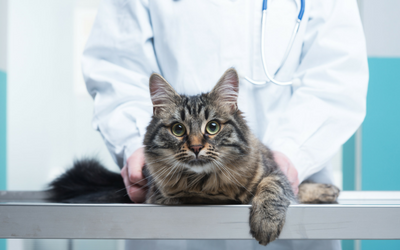Home | Surgical Info | Pre-Surgical Screening for Pets: Ensuring a Safe Procedure
Pre-Surgical Screening for Pets: Ensuring a Safe Procedure
Keywords:
Pre-Surgical Preparation for Your Pet: Ensuring a Safe & Successful Surgery
Why Pre-Surgical Testing is Essential
At Canton Animal Hospital, we prioritize your pet’s safety and well-being before any surgical procedure. Pre-surgical preparation helps us assess overall health, detect underlying conditions, and ensure your pet is ready for anesthesia and surgery. A thorough evaluation allows for a safer, smoother procedure and faster recovery.
"the best way to minimize the risk for the pet is to have a complete pre-surgical evaluation before the procedure. "
However, the potential for complications still exists, and the best way to minimize the risk for your pet is to have a complete pre-surgical evaluation performed before the procedure. This allows the veterinarian to determine if your pet has any underlying problems that might lead to complications, and to make any adjustments necessary to safeguard your pet's health and comfort.
"comprehensive pre-surgical screening for pets"
Featured Resources

We Welcome New Patients!
We're always happy to give your furry friend care at our hospital. Get in touch today!
Contact Us
Key Pre-Surgical Tests & Evaluations
Advanced Pre-Anesthetic Risk Assessment
Evaluates anesthesia safety based on age, breed, and medical history.
Helps identify any potential complications before surgery.
Reduces risk by customizing anesthetic protocols for each pet.
"pre-anesthetic risk assessment for pets"
Comprehensive Blood Work
Evaluates liver and kidney function to ensure proper metabolism of anesthesia.
Checks red and white blood cell counts to assess immunity and clotting ability.
Identifies hidden conditions such as infection, anemia, or organ dysfunction.
"veterinary blood work before surgery"
Urinalysis
Detects urinary tract infections, diabetes, or kidney disease.
Ensures the urinary system is functioning properly before anesthesia.
Chest X-Rays (Three-View Thoracic X-Ray)
Required before tumor removal surgeries to rule out metastasis (spread of cancer).
Evaluates heart and lung health for pets undergoing major procedures.
"pet X-ray for surgery clearance"
Electrocardiogram (EKG/ECG) & & Echocardiography for Cardiac Screening
Identifies heart arrhythmias or abnormalities that may impact anesthesia safety.
Essential for pets with a history of heart murmurs or cardiac disease.
"EKG for pet anesthesia safety"
In some cases, echocardiography is recommended for a more detailed evaluation of heart function.
Echocardiography provides a detailed assessment of heart function, especially for high-risk pets.
Helps adjust anesthetic drugs for pets with existing cardiac conditions.
"echocardiography for pet heart disease screening"
Endocrine Disease Testing (As Needed)
Checks for hormonal disorders such as Cushing’s disease, hypothyroidism, or diabetes.
Ensures conditions are managed before anesthesia is administered.
"thyroid testing prior to surgery is important for both dogs and cats, but for different reasons."
Advanced Imaging (When Necessary)
CT scans or ultrasounds may be recommended for complex cases.
Helps evaluate internal tumors, fractures, or internal organ abnormalities.
"advanced pet imaging for surgery preparation"
Fine Needle Aspiration (FNA) & Biopsy for Tumor Evaluation
Every tumor should be considered cancerous until proven benign. Biopsy and FNA cytology are essential for determining the nature of the tumor.
FNA cytology is crucial for mast cell tumors to reduce allergic reactions during surgery.
"FNA cytology for mast cell tumors in pets"
Biopsies before surgery help confirm tumor type and guide surgical planning.
Post-surgical biopsies ensure that all cancerous tissue was successfully removed.
Histopathology results determine if additional oncology treatment is required.
FNA cytology for swollen lymph nodes helps diagnose potential metastasis or infection.
Without proper biopsy confirmation, there is a risk of incomplete removal, leading to recurrence or spread of cancer.
"importance of biopsy for pet tumor removal
Tailored Pre-Surgical Plans for Every Pet
Not all pets require the same tests—our experienced veterinary team tailors pre-surgical protocols based on your pet’s age, breed, medical history, and type of surgery. If any abnormalities are detected, we adjust the surgical plan accordingly to ensure the safest approach.
"once all the test information has been gathered and analyzed, your veterinarian will make recommendations about the advisability to proceed with anesthesia and surgery."
"customized veterinary surgery plans"
How to Prepare Your Pet for Surgery at Home
Follow fasting guidelines – No food for 8-12 hours before surgery (unless instructed otherwise).
Provide water – Hydration is important, but limit water intake a few hours before surgery.
Ensure your pet is calm – Reduce stress by keeping them comfortable and relaxed.
Transport safely – Use a secure carrier or leash to prevent injury before surgery.
"how to prepare my pet for surgery"
Why Choose Canton Animal Hospital for Pre-Surgical Care?
State-of-the-Art Diagnostic Tools – Advanced blood testing, imaging, and cardiac monitoring for accurate evaluations.
Customized Surgery Plans – Every pet gets a tailored pre-surgical plan for optimal safety.
Experienced Veterinary Team – Skilled professionals ensuring safe anesthesia and successful procedures.
Comprehensive Tumor Evaluation – Pre-surgical FNA and biopsy testing to improve surgical outcomes.
Compassionate Care – We prioritize your pet’s comfort, well-being, and best surgical outcomes.
"best veterinary surgical care in Michigan"
Ensuring the Best Surgical Outcomes for Your Pet! 🐾💙
Featured Resources

We Welcome New Patients!
We're always happy to give your furry friend care at our hospital. Get in touch today!
Contact UsFrequently Asked Questions (FAQs)
Preparing your pet for surgery can feel overwhelming, but we’re here to help! Below are some of the most common questions pet owners have about pre-surgical testing, safety measures, and what to expect before surgery. Our goal is to ensure a safe, smooth procedure and a stress-free experience for both you and your pet.
Tips and Advice from Our Team
Looking for advice about caring for your pet? Our blog features helpful tips and educational material from our team to support your needs.

Pet Arthritis Pain Management – Keeping Dogs & Cats Active
Pet arthritis can cause pain and mobility issues. Our Arthritis Pain Management Guide helps pet owners understand early signs, treatment options, and advanced pain relief solutions like Solensia®, Librela®, and joint injections for better pet comfort.
Read More

